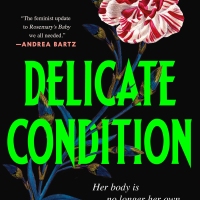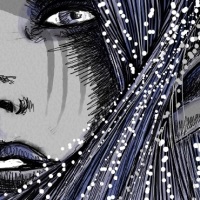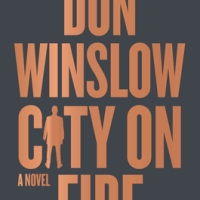Guest Post: “The Hidden Side of Darkness: The Second Bell and The Monsters of Slavic Folklore” by Gabriela Houston
Today, we’re excited to welcome author Gabriela Houston to the BiblioSanctum as part of a blog tour to celebrate the release of The Second Bell, her new fantasy novel described as a Slavic His Dark Materials meets The Bear and the Nightingale. A folklore retelling exploring the themes of family and the strength and empowerment of personal belief, the book is published by Angry Robot and is due to hit shelves March 9, 2021 so mark your calendars! In the meantime, please check out this guest post by Gabriela and also be sure to visit the other stops on the tour!
![]()
THE HIDDEN SIDE OF DARKNESS: THE SECOND BELL AND THE MONSTERS OF SLAVIC FOLKLORE
by Gabriela Houston
 The world of Slavic folklore is without mercy, with little sentiment. The rules must be obeyed, where every new day is a battlefield against the dark forces of the spirit world. Nature is to be respected and feared.
The world of Slavic folklore is without mercy, with little sentiment. The rules must be obeyed, where every new day is a battlefield against the dark forces of the spirit world. Nature is to be respected and feared.
Growing up with Slavic stories and folklore, I have always been fascinated by the dark, the hidden. Slavic mythologies and what we have left of the pre-Christian Slavic traditions, are invariably dark, disturbing even, ever mindful of the dangers lurking just beyond the trees, on the wind and in the water.
A Rusalka might pull you underwater, a Poludnica might cause a stroke, the Kikimora with her screechy scream might drive you mad.
Even the less bloodthirsty creatures, while they might not pull out your heart or gnash your bones, are hardly harmless and most often are at best indifferent to the lives of the humans.
Benevolent magic, where it exists in the old stories, is distinctly transactional and often resembles The Godfather-style “protection”. Lasownik, the dangerous spirit guardian of the woods, might overlook your presence in his forest if you bring him bread and eggs. Should you be less thoughtful, Lasownik has a wide repertoire of catastrophes to send upon you, including paralysis, sickness and a confusion that can stop you from ever going home again. The cat-shaped Gumiennik would protect the untwhrashed wheat, but that very touchy spirit will destroy the whole harvest or even burn down your barn should you disrespect it.
Perhaps those creatures were something else originally. But while we can mourn the lack of written records and reliable and consistent sources for the ancient Slavic customs and pantheons, on the other hand a world of stories and beliefs that grew from the bastardised and twisted mythologies gave birth to something perhaps altogether more interesting. After all, villains hold a fascination angels can only dream of.
And so my bedtime books told the stories of a forlorn topielec (a spirit of a drowned man), who in his search for love hatches a plan to drown a local beauty, except he is thwarted by her crafty mother and so left broken hearted; of a crow, who threatened a giant father with blindness by stealing his only eye so he’d give his only daughter to the crow to marry.
When a monster can be a hero, and their sadness and motives, however unreasonable, form the centre of the story, it creates a fascinating sort of duality to the storytelling, forcing the reader to, if not empathise, then to at least understand the villains while hoping they don’t succeed at the same time.
That ability to see beyond the mask of the monster; to counteract humanity’s capacity for othering, to me is at the heart of Slavic stories. Danger can be beautiful, monstrosity can be understood, commonality can be found.
When I was writing The Second Bell, I thought of how the strigas, in Slavic stories presented as pretty straightforward monsters with vampiric proclivities, and like most monsters residing in the shadows, hidden from view, are said to begin as children born with two hearts. And while we can remain emotionally detached from such a monster while they remain hidden, will this detachment fall apart when we meet its mother.
Danger is still there, but once humanity creeps in, once the bonds between a mother and daughter, between friends and a community are created and exposed, the darkness falls away, and a new story can be told.
![]()
Gabriela was born and raised in Poland, brought up on a diet of mythologies and fairy tales. She spent her summers exploring the woods, foraging and animal tracking with her family. At 19, Gabriela moved to London to study English Literature and obtained an MA in Literature and Modernity. She has worked as an assistant editor and as a freelance writer. Gabriela’s short stories have been selected for the Editor’s Choice Review by Bewildering Stories and have been featured on the Ladies of Horror Fiction podcast. She lives in London with her husband and two children.














Oh that’s realy intriguing!
LikeLike
I do love old myths, I find it is so sad that we lost so much of it, though I do admit when I walk in the woods and see a weird stone, that just maybe, maybe it is a troll
LikeLike
A whole new kind of fantasy themes – and monsters! – should make this a very engrossing read 🙂
LikeLike
Interesting; I don’t know anything about Slavic mythology. I might have a look.
LikeLike
I’m picking this up next, and now I’m looking forward to it even more😁
LikeLike
Are there any “go to” collections of Slavic folklore? I’m definitely intrigued!
LikeLike
Hi!
Gabriela Houston here, most of my research materials are in Polish, I’m afraid, but there are a couple of things in English that I can recommend:
Russian Fairy Tales, beautifully illustrated by Ivan Bilibin have been published by The Planet
On the reference front, Encyclopedia of Russian and Slavic Myths and Legends is an interesting, if not an entirely consistent source.
There have also been a few American and English authors producing novels inspired by Slavic folklore. Of those I can recommend Naomi Novik and Katherine Arden as the most “authentic” in feel!
Happy book hunting!
LikeLike
I’d love to read more including or inspired by Slavic folklore. Though I’m not sure how accurate the mythology was, I remember reading and enjoying Rusalka by C.J. Cherryh long ago. I just added The Second Bell to my TBR.
LikeLiked by 1 person
Pingback: Bookshelf Roundup: 03/06/21: Stacking the Shelves & Recent Reads | The BiblioSanctum
Pingback: Bookshelf Roundup: 03/13/21: Stacking the Shelves & Recent Reads | The BiblioSanctum
Kind of kicking myself for not requesting this one – this piece is so interesting and Slavic myth- what’s not to love. Where was my head at!
Lynn 😀
LikeLike